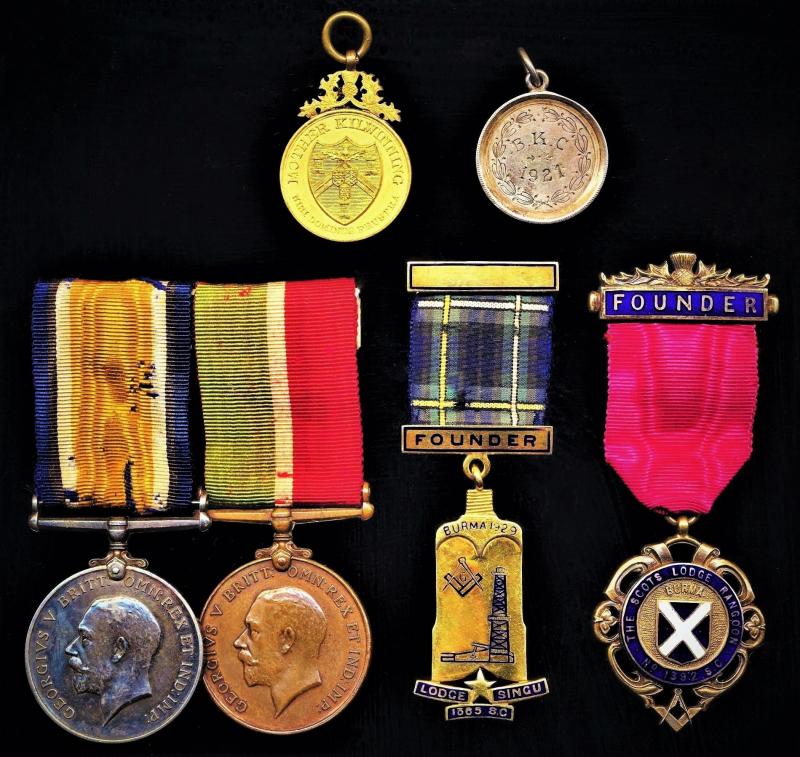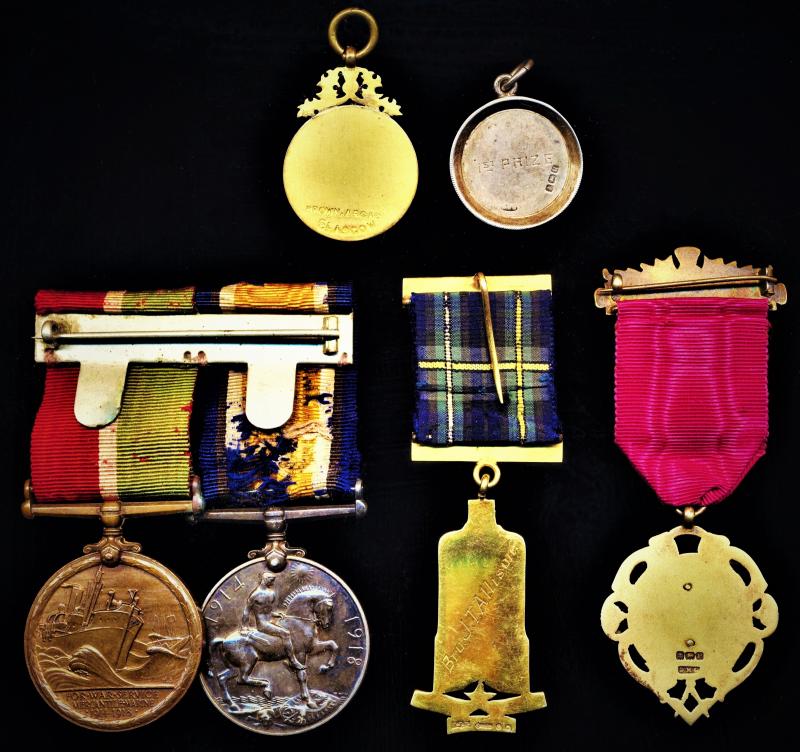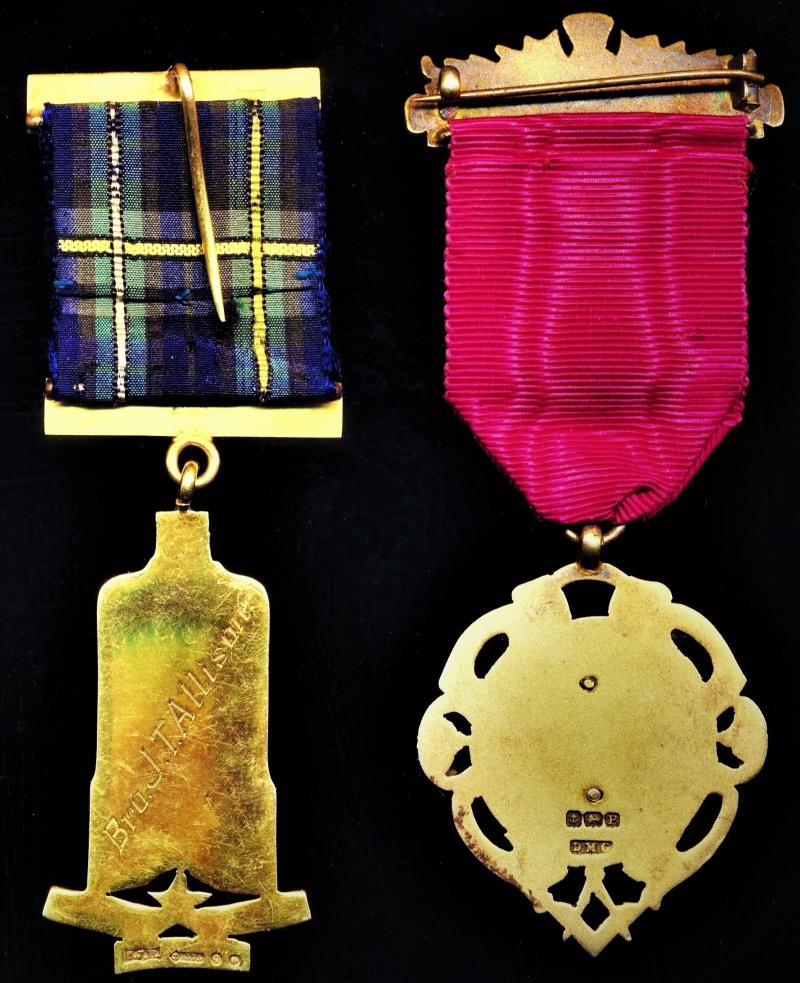A unique Scottish Expatriate & Freemason's, Burma 1942, 'Killed-in-Action' medal group of 4: Inspector, John Thomson Allison, Government of Burma Service late British India Steam Navigation Company
- British War Medal. Silver issue (John T.Allison)
- Mercantile Marine War Service Medal (John T.Allison)
- Freemason Jewel Lodge Singu Burma 1929 (Bro.J.T.Allison.)
- Freemason Jewel Scots Lodge Rangoon. Silver, gilt & enamel
Sold together with 2 x associated prize and or Masonic medals:
- 'Mother Kilwinning' masonic medal. Gilt. Mother Lodge Kilwinning is the oldest Masonic Lodge in the world
- Silver prize medal. Dated 1921. Engraved. B.K.C. 1st Prize with silver hall
Important: John Thomas Allison an Inspector in service of the Government of Burma, is confirmed 'Killed-in-Action' at Mandalay, Burma, on 26 April 1942. Killed at the river port on the Irrawaddy River, during a Japanese Air Raid
Great War Medals: The recipients 2 x Great War medals were sent to him on 12 May 1922 (Ref BT 351/1/2479)
Masonic Jewels: The 2 x Burmese 'Scottish Rites' Masonic Jewels are both extremely rare - the superbly topically designed gold and enamel 'Singu 1929' Founders Jewel is very possibly possibly unique as an extant example. The 2 x enamelled 'Jewels' are described below:
A). Masonic Jewel: Founders Medal 'Lodge Singu 1365 SC'
Obverse: An 'Oil' barrel with 'screw top' suspension. The barrel with enamelled top scroll 'Burma 1929' and below 'Lodge Singu 1365 SC on 3 x scrolls. In centre an enamelled Masons Suare & Compass, and an enamelled depiction of an Oilfield Derrick Tower
Reverse: With recipients name engraved diagonally 'Bro J. T. Allison' with makers marks 'S.J.R.' & 9ct gold 'London' hallmark for 1931
Metal: 9ct gold & enamel
Weight: 19g inc integral fittings
Riband: Tartan design silk with corded edges
Suspension: Fitted with fixed loop to which is attached the integral looped straight suspension bar engraved in enamel 'Founder' with riband and plain top bar with enamelled borders. Reverse complete with gold suspension pin as issued. The reverse of the top bar with 9ct gold hallmarks
Singu (Chauk) is a town and port, north-central (Burma). Situated in the Irrawaddy River basin, it is a petroleum port for the Singu-Chauk oil fields. Traditionally, people of the Mon group gathered asphalt in the area to weatherproof houses. In 1902 the British discovered the Chauk-Lonywa oil field. Later, crude oil from Chauk was sent by a 350-mile (563-kilometre) pipeline to Syriam for refining. Insurgent sabotage of the pipeline after World War II confined marketing of Chauk’s oil to northern Myanmar. Oil tankers began operation on the Irrawaddy River as an alternative means of transport to the damaged pipeline. The Chauk refinery was renovated in 1954, and the pipeline was repaired between Chauk, Tagaing, and Yenenma and between Pyay and Syriam. A pipeline connecting Man and Syriam was completed in 1979. Abundant natural-gas reserves are found in the Chauk oil fields. Paved roads extend from Chauk in several directions, and air connections are accessible through Meiktila town
B). Masonic Jewel: Founders Medal 'Scots Lodge Rangoon. Burma. No 1365 SC'
Obverse: An ornate open-work surround, with single leafs E & W , and below a Masons 'Square & Compass' emblem. In centre a blue and white enamelled shield with St Andrew's Cross or Saltire in centre, with single word 'Burma' on top. This with a blued enamelled band which has the gilt inscription legend 'The Scots Lodge Rangoon No 1392 S.C.
Reverse: Plain with makers marks 'D.M.G.' and silver hallmark for Birmingham 1939
Metal: Silver gilt and enamel. With silver hallmark
Dimension: Approximately 36mm (w) x 48mm (L) inc suspension ring
Weight: Approximately 32g inc integral fittings
Riband: Deep crimson silk moire riband, as issued
Suspension: Fitted with fixed loop to which is a loose ring for the riband. The riband complete with its fitted integral top bar. This with 'Thistle' flower on top and below an enamelled blue tablet with 'Founder' inscribed in gilt. Reverse of top bar complete with original gilt long hinged pin and clasp fittings as issued
Scottish Masonry in Burma: There were six 'Scottish Lodges' in Burma, in 1941, they were:
1) Peace & Harmony, No.834. Rangoon. Charter granted 1896
2) Hanthawaddy, No,1053. Insein. Charter granted 1908
3) Tawnpeng, No. 1326. Namtu. Charter granted 1924
4) Singu, No.1365. Chauk. Charter granted 1929
5) Ady, No.1377. Insein. Charter granted 1931
6) The Scots Lodge, No.1392. Rangoon. Charter granted 1938
The Institute of Mechanical Engineers, of which John had been a member since 1936, published the following obituary to him in 1943;
Quote,
JOHN THOMSON ALLISON was killed by enemy action while gallantly assisting as a volunteer in the evacuation of wounded men from Burma on 26th April 1942, at the age of 45. Mr. Allison received his technical education at the Royal Technical College, Glasgow, and served his apprenticeship, from 1913 to 1918 with Messrs. Barclay, Curle and Company, Ltd., Glasgow. During the following eight years he sailed in ships of the British India Steam Navigation Company, Ltd., rising to be second engineer, and in this period he obtained his Board of Trade First-Class Engineer's Certificate.
He then entered the service of the Government of Burma and was appointed inspector of boilers (senior grade) with responsibility to the chief inspector for the annual inspection of all boilers on land, in one division of Burma, and for the maintenance of all repairs. In addition, since January 1935, he had also held the position of inspector of factories.
Mr. Allison was elected an Associate Member of the Institution in 1936.
Unquote
An exceptional reference to the death of Thomas Allison, and indeed the plight of Scottish Freemasons in Burma in 1941-1942, is accessible on the 'Facebook Pages' of The Grand Lodge of Antient Free and Accepted Masons of Scotland', see:
https://www.facebook.com/GrandLodgeScotland
Contained in a 'Letter from Burma', dated Simla, 3 October 1942, from William Air, District Grand Master for the Scottish Lodges in Burma, is a 'Situation Report' to the The Grand Lodge of Antient Free and Accepted Masons of Scotland, pertaining to events following the Japanese invasion of Burma, and includes specific details about the death of Brother Allison. The letter is lengthy and extremely detailed, and we are below quoting only a few of the extract parts relevant to the backstory - and ultimate fate of John Allison. However we strongly recommend clients to read the entire document, as it is an important document pertaining to the history and fate of Scottish Freemasonry in Burma, 1941-1942:
Quote,
'LETTER FROM BURMA - 1942'
From Air,
Secretary,
Simla India, 3rd October 1942
Dear Sir and Brother,
I have to submit for the information of the Most Worshipful Grand Master Mason of Scotland and Office-bearers and members of Grand Lodge my report on the situation arising from the occupation of Burma by the enemies of the Crown so far as it affects Scottish Freemasonry...........
The conduct of the affairs of the District Grand Lodge of Burma and the six Daughter Lodges therein continued formally until December 1941, when the entry of Japan into the war, steps had to be taken to meet any attack which might develop on any of the several of Burma's strategic frontiers. Such steps involved the diversion of the energies of many members to essential work in time that was formally devoted to Masonic activities, and further the many calls on the British of all classes militated against the coming forward of prospective candidates.
Consequent to the bombing of Rangoon on the 23rd and 24th of December, there was naturally a heavy exodus from the Rangoon area, and the lighting restrictions which had formally been in the nature of irksome trial maneuvers became a constant and readily accepted necessity. This together with the intensification of the incidence of duty periods of voluntary workers further militated against the holding of Masonic meetings at the stated periods. The Election and Installation of Office-bearers for 1942 was however carried out with the exception of Lodge Singu, No.1365, whose members were unable to meet during the exigencies of the military situation and the calls of the professions of the majority of its members. Due to the fact that the responsible officials of each of the Lodges are either still in Burma or else scattered over India and elsewhere, I find it difficult to confirm that now somewhat hazy recollections as to the incumbents of the three principal chairs of each Lodge and I prefer to make this the subject of a letter communication, after receipt of such confirmation.
The election and installation of District Grand Lodge Office-bearers, due respectively in February and March 1942, could not be carried out as the evacuations of Rangoon was ordered on the 20th of February, while the city fell into enemy hands on the 8th of March. Prior to the former date, the records of the District Grand Lodge were taken upcountry for safety's sake and kept in the custody of a Brother in the Oil Fields area, which, at the time was considered secure. The situation, however, deteriorated so quickly that there being obviously, no chance of getting such records out of the Country by the land route - and Air transport for such articles had long been out of the question - it was decided to bury the same in tin-lined trucks. The records of Daughter Lodges, however, had to be abandoned in various circumstances depending on the situation of the Brethren responsible for same. I, myself, got away from Rangoon all my personal regalia, records, ritual and book only to have the former completely destroyed when the wagon containing them was blown sky-high by an enemy bomb. The only Masonic possession left to me is my Certificate of Life Membership of my Mother Lodge.
After leaving Rangoon contacts with other Brethren became increasingly difficult and entirely fortuitous. All forms of transport were, naturally, at the disposal of the forces of the Crown, and, in the end, those who did get out of Burma, did so by various ways and means - some in conditions far from pleasant. Many tales of heroism in extremely trying and dangerous circumstances have been related and I am sure that there are that have not - nor never will - come to light. Death reaped a heavy harvest on the several route from Burma to India. Among those who perished was my staunch and well esteemed Deputy District Grand Master, Brother S. E. Walker, O.B.E., Honorary Senior Grand Deacon, who died shortly after reaching civilisation after a trek of several hundred miles undertaken in a spirit typical of Brother Walker, who insisted on seeing safely out of Burma all the staff of the Wireless Branch of the Burma and Telegraphs for whom he was responsible. He had not survived long enough to enjoy the honour which had been so deservedly conferred on him in the New Year. His loss will be a very great one to the world in general and Freemasonry in particular and much sympathy is felt for his widow and two children who so devoted anticipated his reunion with him in India.
The fell hand of death claimed another Brother of the District Grand Lodge, John T. Allison, former District Grand Director of Ceremonies, who was the Right Worshipful Master of the youngest Scottish Constitution Lodge of the District (No.1392) for the second and third years of its existence. The circumstances attending to his death are the most deplorable, in that he had volunteered to assist in the supervision of River Transport at Mandalay, when might well have been on his way to safety. He was, however, killed during one of the many fierce bombing attacks made on Mandalay by the Japanese. Other Brethren have prematurely passed to the Great Beyond as a result of this cataclysm which has only temporarily, we hope, excised Burma from the list of countries where Freemasonry holds its beneficial sway. Among those is Brother F. B. Ady, Honorary Junior Grand Warden, my predecessor as District Grand Master of Burma, who died in a Southern India Hospital in a tragic separation from the remaining members of his family. His Masonic career, up to the time when ill-health precluded his active participation in the Masonic affairs of the District, is well known to you and it is proposed, in due course to erect a headstone to his memory.......
In conclusion I would like to assure the Most Worshipful Grand Master Mason of Scotland that the Scottish Freemasons in Burma have not lost heart and that, with the eventual return of Burma to the British regime which is not doubted, Scottish Freemasonry will, without question, rebuild in the ashes of all that has been burned down, an even finer and more active establishment than that which has been so rudely terminated in its early days.
In the meantime, such of us that are able will continue to give our support to Scottish Freemasonry through Lodges in India under the Grand Lodge of All Scottish Freemasonry in India, ever remembering our duty to our duty to our Mother Grand Lodge to whom we send our unqualified expressions of continued allegiance and devotion.
(Sgnd.) William J. Air,
District Grand Master
P.S. I confirm having wired you to-day as follows:-
"Masonica, Edinburgh - Regret to report deaths ADY, P.D.G.M., Walker, D.D.G.M., Allison, P.D.G.D.C. Please advise Sinclair (Grand Secretary General A & A Rite). Wish Recommend CAMPBELL, S.D.G.M., for H.S.G.D. Report situation Burma District, posted. Send copies of Proceedings 41 - 42.
AIR, D.G.M.
Burma Grand Hotel."
Unquote.
John Thomson Allison, son of John T. Allison and Eliza Allison was a native of Glasgow, Scotland, where he was born on 3 February 1897. He was educated at Willowbank Public School, Glasgow, 1904-1912, with technical education at Kent Road Public School, Engineering Classes 1912-1914, and The Royal Technical College, Glasgow, 1914-1916. His apprenticeships between 1913-1918, were with Messrs. Barclay, Curle and Company, Ltd., Glasgow (as an Apprentice Fitter). Between March 1918 - March 1926, he served with the British India Steam Navigation Company, or 'B.I.' as a Marine Engineer, progressing through the Engineer ranks from 5th Engineer in March 1918 to 2nd Engineer in April 1921. In 1926 he took up a highly responsible and important appointment as 'Inspector of Boilers' (Senior Grade) to the Government of Burma. In 1935 he was additionally appointed 'Inspector of Factories'. He was directly responsible to the Chief Inspector of Boilers for the annual inspection and granting of Certificates for all land boilers in one division of the province of Burma. Responsible for the registration and determination of all W. P. of all new and second hand boilers, also for ordering, supervising, and testing all repairs to boilers and steam pipes as laid down in the Indian Boilers Act of 1923 (Burma was governed as a province of British India until 1937) . He was also responsible to the Chief Inspector of Factories for all duties performed as an Inspector of Factories under the Indian Factories Act 1934
The importance of the Burma Oil Fields in 1941, cannot be underestimated - it was vitally important, and the gold of the invading 'Japanese'. British Burma exported its first barrel of crude oil in 1853.The London-based Burmah Oil Company (BOC) was established in 1871 and began production in the Yenangyaung field in 1887 and the Chauk (Singu) field in 1902. BOC enjoyed a monopoly in the sector until 1901, when the American Standard Oil Company launched operations in Burma.Oil supplies largely met the demand of British India. Prior to World War II and the Japanese invasion of Burma, oil production stood at 6.5 million barrels annually
With the start of the Pacific War, and the Japanese invasion into Burma, the destruction of the Burma Oilfields became a priority for the departing British. During the chaos that engulfed Burma in 1941-42, John Thomson Allison, a seasoned Marine and Mechanical Engineer, with long experience of the Burma Oilfields, volunteered to play a significant part in both helping in the evacuation of British personnel and expatriates from Burma, and moreover contributing to assisting in the destruction of the oilfields, and denying the Japanese the prize they most sought in Burma
A unique 'Colonial' service medal group to a resident Scottish expatriate, who was 'Killed-in-Action', Burma 1942, including two extremely rare, 'Scottish Rites Masonic Jewels'
Condition: GVF
Code: 20868







